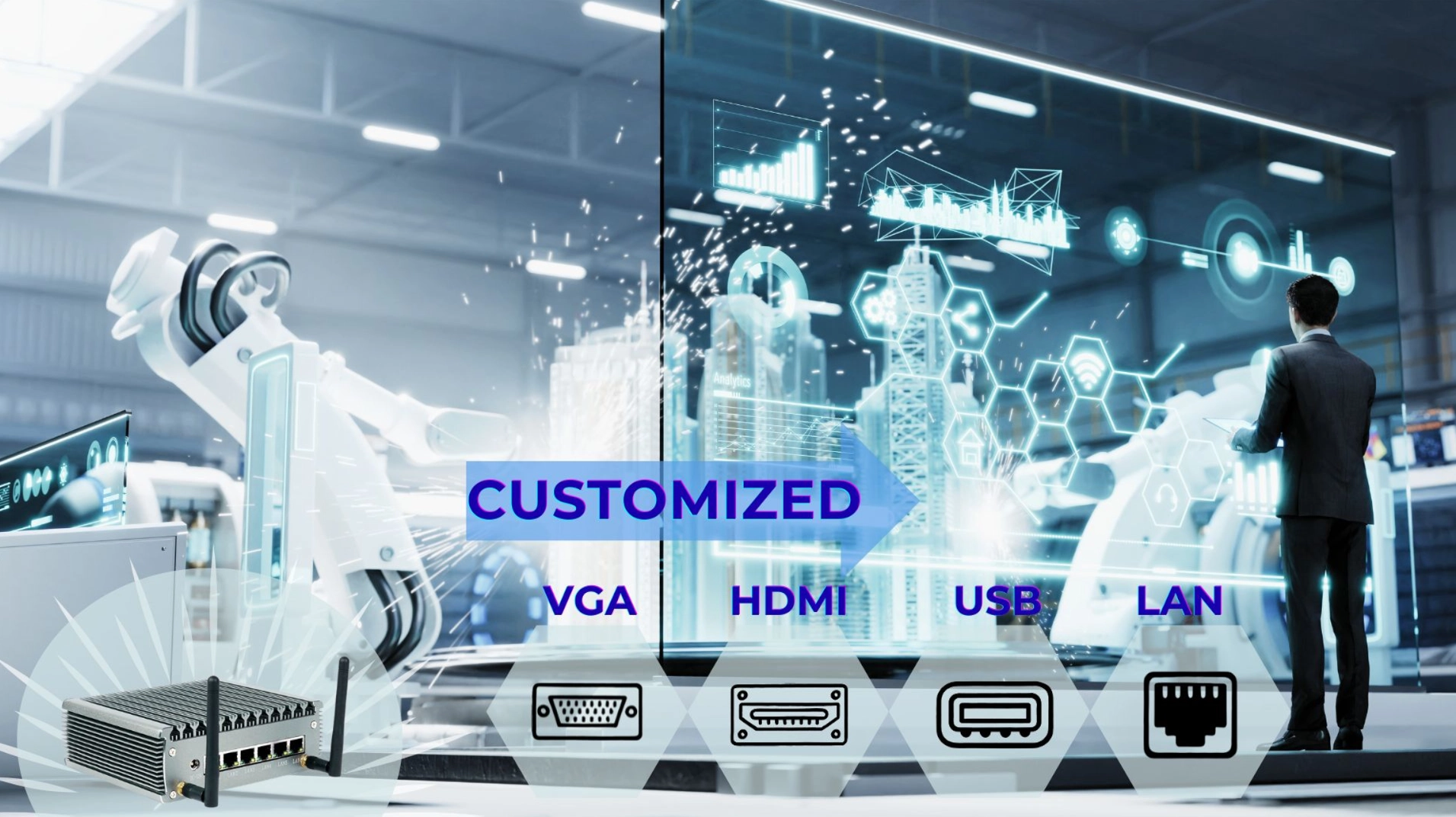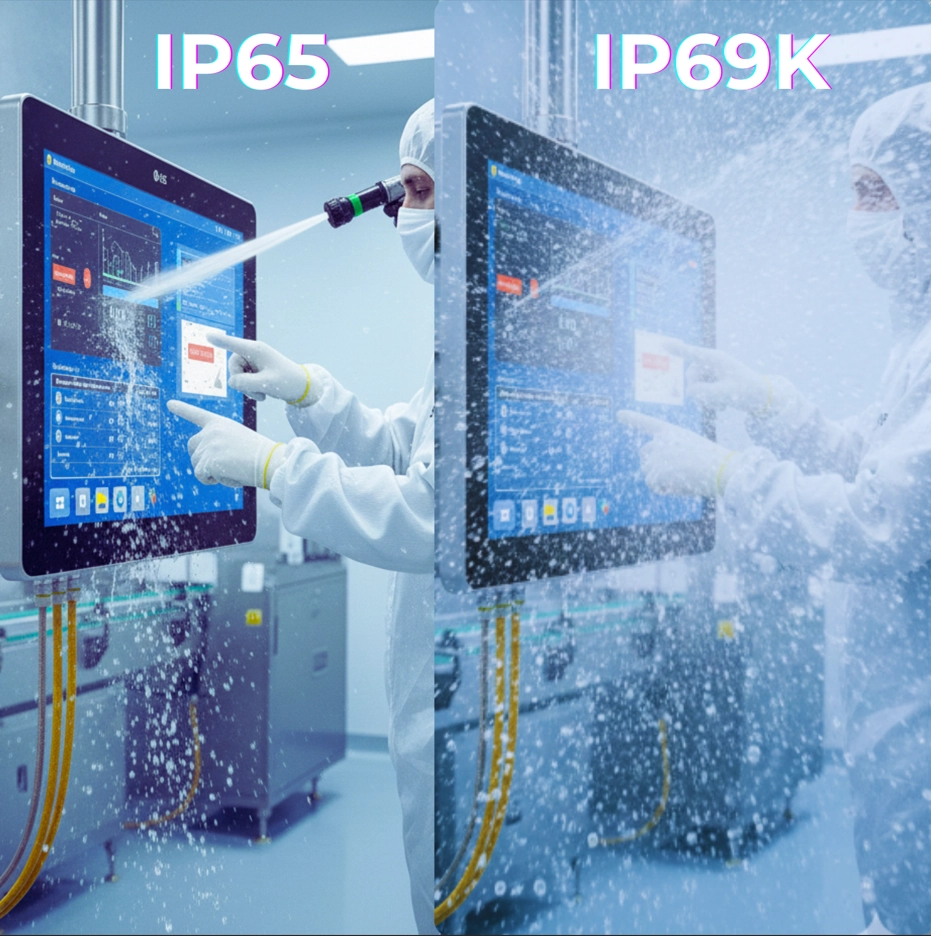How Modular Design Enhances Industrial Integration and Flexibility
The Importance of I/O Expansion in Embedded Box PCs
Why Flexibility Matters in Industrial Integration
In the fast-evolving world of industrial automation, system requirements are never static. Every machine, control cabinet, or networked environment may demand a different combination of ports, voltages, or data interfaces. This is where I/O expansion becomes a cornerstone of embedded box PC design. Flexibility in I/O not only extends a product’s lifespan but also allows manufacturers and integrators to adapt quickly to changing standards without redesigning entire systems.
From Standard Interfaces to Customized Configurations
Most embedded box PCs come with a set of standard interfaces such as USB, LAN, HDMI, and COM ports. However, industries like transportation, energy, and factory automation often require special configurations — for example, multiple isolated COM ports, extra LAN interfaces with PoE, or specific communication buses such as CAN or Modbus. Having the ability to tailor these interfaces at the hardware level enables seamless integration into diverse industrial systems.
Balancing Compact Design and Connectivity
The engineering challenge lies in achieving high connectivity within a compact, fanless enclosure. Space is premium inside an embedded chassis. Smart board design, modular daughter cards, and stacked connectors allow engineers to provide rich I/O options without compromising thermal or mechanical integrity.
Common I/O Interfaces and Industrial Standards
Essential Interfaces: USB, LAN, HDMI, COM, and GPIO
These are the backbone of most embedded applications. USB ports handle peripherals, LAN ensures Ethernet-based communication, HDMI delivers display connectivity, while COM (RS-232/422/485) provides compatibility with legacy industrial equipment. General-purpose I/O pins (GPIO) further allow simple control tasks such as triggering alarms or toggling sensors.
High-Speed and Specialized Interfaces: PCIe, M.2, mini PCIe, CAN Bus
Modern embedded box PCs adopt high-speed interfaces like PCI Express (PCIe) and M.2 slots to accommodate AI accelerators, NVMe storage, or wireless modules. Mini PCIe remains widely used for LTE/5G communication and additional I/O cards. CAN Bus, on the other hand, is a favorite in automotive and machine-control applications due to its reliability and deterministic communication.
Power and Communication Ports for Industrial Use
Industrial PCs differ from consumer PCs through their power and communication interfaces. They typically support wide-range DC input (9–36V), ignition control for vehicle systems, and sometimes Power-over-Ethernet (PoE). These features make deployment flexible in control cabinets, vehicles, or remote stations where stable AC power may not be available.
Modular Design for Expansion and Upgradability
Modular Architecture: Swappable Boards and Add-on Cards
A modular structure divides the mainboard and expansion modules, allowing add-on cards to be swapped or upgraded easily. For instance, one model may offer two expansion slots supporting PCIe and mini PCIe simultaneously. This enables users to install communication cards, frame-grabbers, or digital I/O modules without redesigning the base platform.
Benefits of Modular I/O for OEMs and System Integrators
For OEMs, the modular concept minimizes development time and certification costs. Instead of building multiple hardware variants for different customers, a single base unit with optional modules covers diverse requirements. For system integrators, it simplifies field maintenance—modules can be replaced individually without shutting down the entire system.
Case Example: Expanding from 4 LAN Ports to 6 via Add-on Module
Consider an industrial automation project that requires six isolated LAN ports for separate control networks. A standard box PC offers four. Through a simple add-on LAN module installed in a mini PCIe slot, two additional ports are added — no redesign, no firmware modification. This kind of modular scalability saves engineering hours and ensures configuration consistency across multiple deployments.
Customization Options for Embedded Box PCs
BIOS-Level Customization and Firmware Tuning
Customization doesn’t end with hardware. BIOS-level adjustments can define I/O mapping, watchdog timers, and boot priorities. OEM customers may request custom BIOS splash screens, serial port configurations, or power-on behaviors. Such fine-tuning ensures that every embedded PC boots predictably in mission-critical environments.
Housing and Mechanical Customization
Beyond the electronics, mechanical design plays a vital role. Some clients require specific mounting holes, connectors positioned differently, or a customized aluminum front panel with company branding. Using in-house CNC machining, manufacturers like Beyond Info System (BIS) can tailor the chassis, labeling, or port arrangement according to the project’s physical constraints.
Software and OS Integration
Pre-installation and optimization of operating systems such as Windows IoT, Ubuntu Linux, or Android streamline the deployment process. Integrating device drivers, security packages, and customer-specific applications at the factory reduces field-side configuration time and guarantees a stable, ready-to-deploy platform.
Application Scenarios: Where Custom I/O Matters
Industrial Automation and Machine Control
In manufacturing lines, embedded box PCs connect PLCs, robotic arms, barcode scanners, and sensors. I/O customization allows engineers to add isolated COM ports for RS-485 communication or digital I/O lines to trigger relays. The result is a unified control system that synchronizes machines with precision and minimal latency.
Transportation and Vehicle Systems
For railway control, fleet tracking, and public transport systems, customized box PCs integrate CAN Bus, GNSS modules, and LTE/5G communication. Wide-range power input with ignition sensing ensures safe startup and shutdown. These rugged units withstand vibration and temperature fluctuations that would damage typical commercial PCs.
Smart City and Energy Management Systems
In smart-building and energy applications, embedded box PCs serve as IoT gateways collecting data from HVAC systems, smart meters, and environmental sensors. Modular Ethernet and RS-485 ports allow connection to multiple BMS networks, while additional M.2 modules handle wireless connectivity. This flexibility enables scalable and future-proof urban infrastructure.
FAQ — Embedded Box PC Customization Insights
Q1: Can I add more COM or LAN ports to my existing Box PC?
Yes. Most modern embedded box PCs support modular expansion through mini PCIe or M.2 slots. Additional I/O cards can be added to increase COM or LAN ports without changing the main system design. Integration typically requires only minor driver installation.
Q2: What’s the difference between PCIe and mini PCIe for expansion?
PCIe offers higher bandwidth and supports a wide range of full-size expansion cards used for AI acceleration, frame grabbing, or motion control. Mini PCIe, being smaller, is used for compact modules such as wireless cards or additional I/O interfaces. Both share similar signaling but differ in mechanical size and pin count.
Q3: Does customization affect product lead time or certification?
In most cases, customization through modular design adds minimal lead time — typically 1–2 weeks for integration and testing. Because the base model remains certified, only the modified module may require validation, making the process efficient and compliant with industrial standards.
Q4: What level of customization does BIS provide?
Beyond Info System provides both hardware and firmware customization. Options include specific I/O layouts, BIOS configuration, branding, and mechanical redesign. The company’s R&D and manufacturing team ensure all modifications maintain quality consistency and industrial compliance.
About Beyond Info System (BIS) — Customizable Industrial Computing Solutions
BIS Expertise in Modular and OEM Design
Beyond Info System is a Taiwan-based industrial computer manufacturer specializing in Panel PCs, Embedded Box PCs, and Rugged Computing Solutions. The company’s R&D team combines mechanical design, electrical engineering, and thermal management expertise to deliver flexible and robust systems for global OEM and system integration partners.
BIS’s modular design philosophy allows customers to scale configurations effortlessly—from entry-level controllers to AI-ready industrial edge computers.
Featured Products for I/O Expansion and Integration
AI Ready Rugged Embedded PC – RML-L67-NV
Featuring NVIDIA Jetson-ready platform, dual M.2 slots, and extended I/O for AI inference at the edge.Embedded Automation Box PC Series
A versatile line of fanless, compact PCs supporting modular LAN, COM, and wireless expansion for smart automation and industrial applications.
Partner with BIS — Flexible, Reliable, and Industry-Proven
With over a decade of experience serving European and global system integrators, Beyond Info System stands as a dependable partner offering:
- Low MOQ and rapid prototyping
- Full customization from concept to production
- In-house mechanical and CNC manufacturing
- Strict quality control including vibration, thermal, and IP testing
BIS continues to help customers reduce integration costs, accelerate time-to-market, and achieve long-term system reliability.
For more information, visit: 🌐Contact BIS


